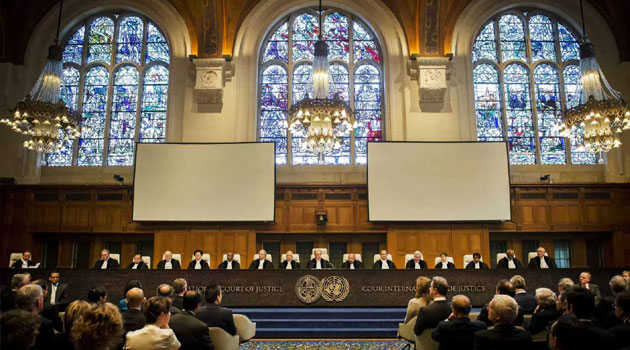
The court heard that Kenya was planning to issue licenses for oil exploration in the disputed maritime boundary area in 2017 and had advertised for tenders even after Somalia had filed its maritime dispute case at the ICJ/FILE
NAIROBI, Kenya, Sep 23 – Kenya shouldn’t dare imagine that because of its support to Somalia, that it can reward itself with Somalia’s maritime space.
Those were the warning remarks made by Somalia during the conclusion of the oral submissions in the maritime boundary dispute case before the International Court of Justice (ICJ).
“Kenya sacrifices like those of other countries including Uganda, Djibouti and Burundi,” Somalia Agent Mona al-Sharmani appreciated.
However, she explained such support did not; ‘constitute a reason to deny Somalia the right to which the international law entitles it. Kenya cannot as it seems to suggest, expect compensation in form of maritime areas that otherwise pertain to Somalia. Kenya’s political arguments have no legal bearing before this court.”
Sharmani cautioned that Somalia would not allow Kenya to take what rightfully belonged to its people – a reason why Somalia moved to The Hague based court.
Together with the rest of the legal team, the lawyers detailed to the court information to demonstrate that Kenya was interested in taking its portion of the maritime space in the Indian Ocean.
The court heard that Kenya was planning to issue licenses for oil exploration in the disputed maritime boundary area in 2017 and had advertised for tenders even after Somalia had filed its maritime dispute case at the ICJ.
“I would respectfully remind the court that less than a month before Kenya filed its preliminary objections in Oct 2015, it was soliciting tenders for assessment surveys to be carried out in the disputed area with the view to issuing licenses in 2017,” she explained.
It was her submission that the tendering process was spearheaded by the National Oil Corporation of Kenya through the Energy and Petroleum Ministry which was expected to issue a date for the open licensing phase in 2017.
“The National Oil Corporation of Kenya published an expression of interest for provision of 3D multi-client broadband seismic offshore survey in the shallow waters of the Lamu offshore basin.”
According to Sharmani, the tendering documents also contained maps indicating areas that were to be surveyed along the disputed nautical area.
The court further heard that Kenya had commissioned two other seismic surveys in the disputed area before August 2014 when Somalia filed its application, another reason that informed its decision to move to the UN court.
“One of its licensees even conducted a sea code drilling operations in one of the disputed blocks. It was exactly this pattern of behavior that was s of such concern to Somalia and ever since and has heightened our sense of urgent to secure a fair and objective determination of what is ours,” she explained.
It was Kenya’s ‘changing behavior’ that worried Somalia and prompted it to seek for a legal settlement of the unending maritime dispute with Kenya.
“It is exactly the situation of confusion and conflicting claims that makes the earlier resolution of maritime boundary dispute necessary and urgent.”
During its oral submission on Monday, Kenya’s legal team lead by Attorney General Githu Muigai told the court that Kenya’s activities at the disputed area were only transitory.
READ: Kenya asks International Court of Justice to dismiss Somalia’s maritime boundary claim
Kenya further told the court that it was considerate of Somalia’s delicate security and political situation the reason why negotiation which it argued was supported in the Memorandum Of Understanding (MOU) signed between the two countries was a better way of resolving the dispute instead of the court.
READ: Kenya says it means well to Somalia in ongoing maritime case
Somalia in its initial rejoinder said it did not trust Kenya and accused it of changing contents of the MOU.
READ: Kenya is a dishonest neighbour, Somalia tells International Court of Justice
Following the conclusion of oral submissions on Friday, the court will in the next few weeks issue a ruling to determine if it has jurisdiction to hear the matter or if the two parties will revert to negotiations as suggested by Kenya.








































